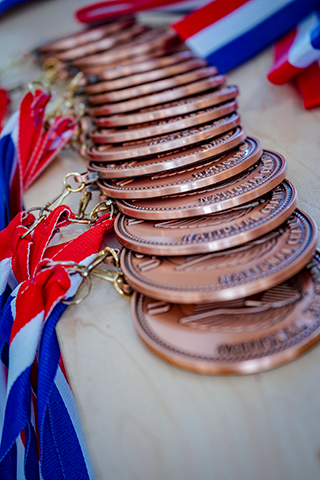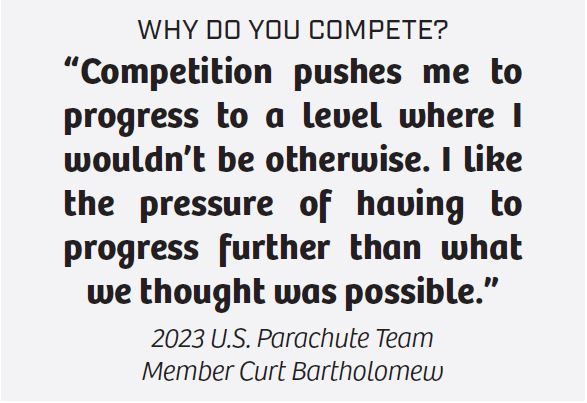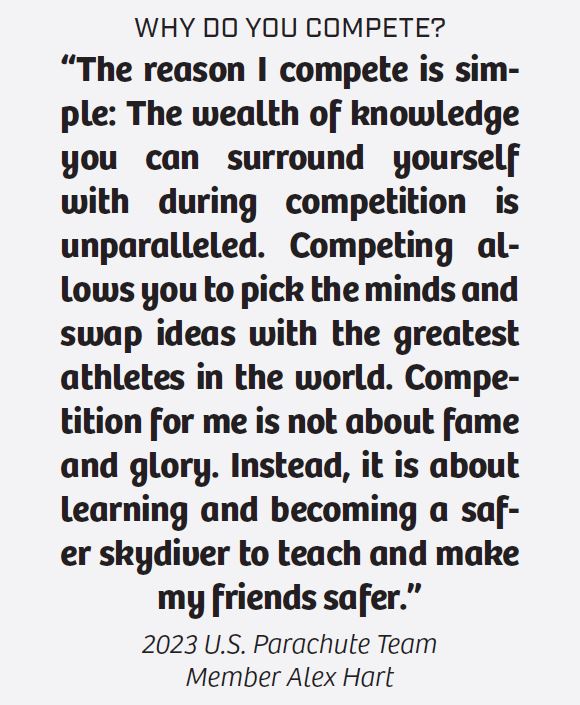Why Compete?
Photo above by David Cherry.
The Oxford English Dictionary defines “competere,” the Latin origin of the word “competition,” as “to strive (alongside another) for the attainment of something.” Competition exists in every aspect of our lives. It’s normal to feel competitive and want to be the best at what you do, especially in the world of sports. Becoming good at a sport is difficult and physically demanding. And it should be. It is a test of your technical and tactical capabilities and shows you what you are made of mentally and emotionally.
 Striving for success is at the heart of competition, but there are many reasons why you may want to compete in your favorite skydiving discipline. Competing can help you:
Striving for success is at the heart of competition, but there are many reasons why you may want to compete in your favorite skydiving discipline. Competing can help you:
Grow Your Passion for the Sport
If you love what you are doing, you will constantly push yourself to develop further. If you’re a passionate individual who puts your heart and soul into everything you do, you’ll be among others who feel the same way. Competing can feed your passion for the sport and give you purpose. Delivering the best results for yourself, your teammates and your country while inspiring others provides great motivation to continue progressing.
Commit to Self and Team
What is commitment? It is working together, making decisions and supporting one another to overcome obstacles and resolve conflicts. It is holding each other to high principles and sharing success. The effort, dedication and sacrifices you make will directly affect your own and your team’s success.
Build Character
In training and in competition, you get to meet yourself face-to-face and see your imperfections and weaknesses. It’s unavoidable. In essence, you are competing against yourself. Competition can be a powerful personal development tool, since it is about who you become as you get better at what you do.
Increase Self Confidence
You must have faith in your talent and ability to achieve your goals. Judging yourself to be capable of success increases your chances of actual success, while judging yourself as not capable of success reduces your chances of actual success. Henry Ford said it best: “Whether you think you can or can’t—you’re right!” Believe in yourself.
 Maintain Discipline and Composure
Maintain Discipline and Composure
Competition helps you learn to maintain control over your communication and body language, especially when emotions are high! It requires you to pay attention to detail, maintain technique and keep your composure with teammates and opponents, even when you’re tired or frustrated. Look at successful teams; do any of them have undisciplined athletes?
Toughen Up
Mental strength is one of the pillars of life, and competition can help you improve on it. Do you treat a mistake as part of the game that you can recover and learn from? Or does your mental state fall apart after making a mistake? Basketball coach Jim Valvano advised, “Never give up! Failure and rejection are only the first step to succeeding.”
Sharpen Your Focus
The laser focus required to compete gives you the mental fortitude to block out distractions, and you can actually learn to overcome procrastination! Looking into a complex task with curiosity and without fear can help you establish a master plan, identify the task’s most crucial aspects and set priorities.
Hold Yourself Accountable
While training and competing, you’re striving to deliver your best every day, which creates the habit of holding yourself accountable to high expectations. Another basketball coach, John Wooden, advised, “Don’t measure yourself by what you have accomplished, but by what you should have accomplished with your ability.”
Master Your Skills
Training for competition is learning on steroids! You train to properly execute the mechanics and master them before going head-to-head with others. It’s not maximum effort that creates champions, it’s consistent training and careful evaluation. “Excellence is not a singular act but a habit. You are what you do repeatedly,” Shaquille O’Neal said.

Photo by Joseph Thomas.
Become a Leader
Competing builds leaders, and those leadership skills translate to tasks both on and off the competition stage. Great leaders set the example in practice and performance by putting their team’s successes before their own. Being on a competition team teaches you to step up when teammates are losing confidence or dealing with mental weakness. It teaches you to build up others’ strengths instead of tearing them down.
Create Bonds
Competing brings people together and creates friendships.

Deal with Success and Failure
Competition inevitably results in either success or failure, but it is how you handle the result rather than the result itself that will determine whether your competitive experience is positive or negative. Will it make you or break you?
After decades of research on success and achievement, psychologists uncovered two opposing mindsets an individual can possess: growth and fixed. Those with fixed mindsets view their traits and qualities as carved in stone and unchangeable. Success is solely about establishing superiority, and it must come easily since showing effort and failing can be devastating. Those with growth mindsets view themselves as moldable through hard work and dedication. Their success is a product of the process that led to it, and competition can result in more than just success or failure; it can result in an experience with a multitude of benefits. Success comes from effort, learning and improving and becomes its own reward.
If you’re pushing yourself to achieve in competition, understand that you’ll make mistakes and go through failures. There is no smooth, paved path to success. But you can overcome these hardships with persistence. Keep pushing forward. Competition can make a difference in your life. Having a big goal promotes growth so you can become the best version of yourself. And you may even find that you’re leading a happier life.
Looking for a goal? Skydive Paraclete XP in Raeford, North Carolina, is hosting the USPA National Championships of Accuracy Landing, Artistic Events, Canopy Formation, Canopy Piloting, Formation Skydiving, Speed Skydiving and Wingsuit Flying from September 1-30, 2023. Many of the disciplines include classes for beginner, intermediate and advanced skydivers in addition to the open class. More information is available at uspa.org/nationals and by reviewing the Skydiver’s Competition Manual at uspa.org/scm.
 About the Author
About the Author
With 19 years in the sport and 8,000-plus jumps under her belt, Yuliya Pangburn, D-29142, has a passion for coaching canopy formation skydiving and close-proximity flying. As a member of the U.S. Parachute Team since 2010, she competes in the national and world arena.